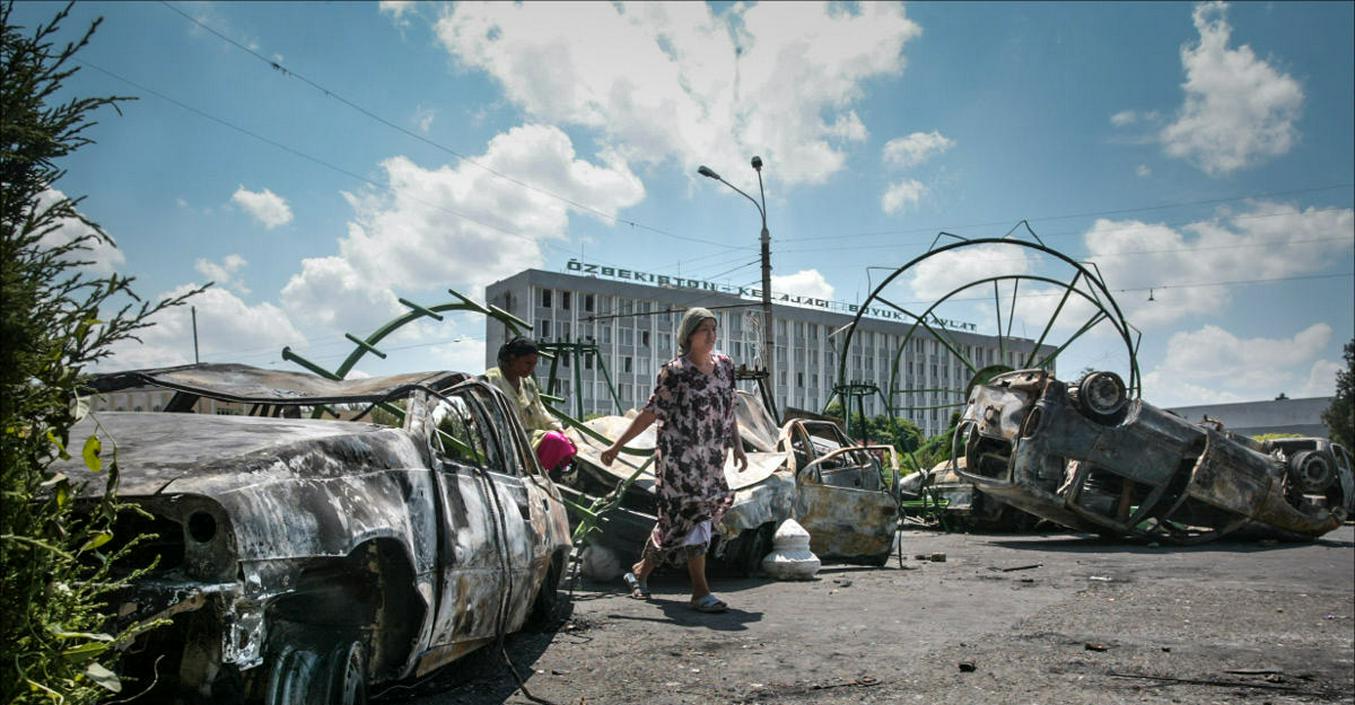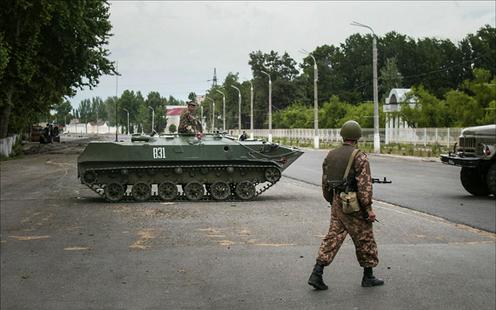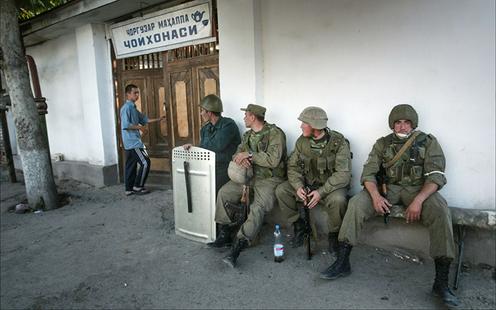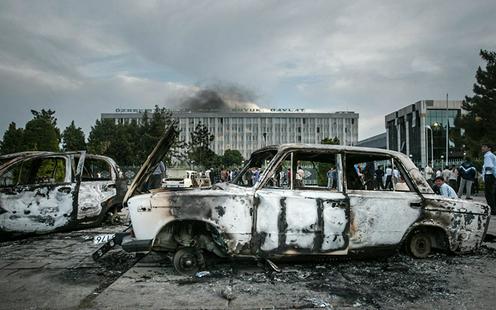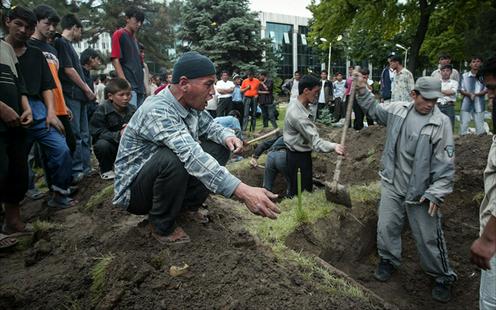15 years ago, one of the most tragic episodes in modern Uzbek history unfolded in the Fergana valley. By unofficial counts, the so-called “Andijan events”, during which the country’s government sent the military into the city to quell unrest, cost the lives of over 700 people (official reports speak of 187 deaths). In all likelihood, accounts of the events will forever feature statistics qualified by the terms “about”, “roughly” and so on. The Uzbek authorities have down everything in their power to ensure that the truth about the bloodshed never emerges into the full light of day.
Local media prefer to avoid the topic
In December 2016, Shavkat Mirziyoyev was elected the new president of Uzbekistan and a “thaw” set in around the country. Local media outlets started making efforts to criticise the authorities, and the State Committee on Statistics and other government agencies began to publish statistical data and figures that bore some semblance to reality and which would previously have been considered top secret. Yet the new sense of openness has left the Andijan events virtually untouched. In the three years of the thaw, only two or three Uzbek media outlets have made any mention of the tragedy. They have written above all about the documentary film The Night That Shook the Golden Valley (Oltin vodiyni titragan tun), based on the Uzbek state prosecutor’s office’s account of a report by foreign experts that placed the blame for the massacre in Andijan on Islamist militants who gave the government no option but to respond with force.
Of all the media outlets in Uzbekistan, perhaps only Kun.uz has published material mentioning the events of 2005 each 13 May in recent years. It is worth noting that, whereas in 2017 the outlet merely published information about the above-mentioned documentary film that reflected the official narrative, two years later it was publishing eyewitness testimony and posing some uncomfortable questions: how many people were in fact killed during the disturbances and might it have been possible to avoid casualties among peaceful demonstrators?
In 2019, the website Qalampir.uz published an interview with former interior minister Zokir Almatov, a direct participant in the Andijan events. The ex-interior minister stated that “the Andijan incident” was “a painful question” for him. Almatov said that many consider him the culprit for the bloodshed, since it was he personally who had been giving the orders at the time. Yet the former minister argues that in Andijan terrorists were attempting to carry out a planned coup d’état. “I’m sorry, but back then we did everything we could,” said Almatov.
In February 2020, Deputy Prosecutor-General of Uzbekistan Svetlana Artykova went a little further in shedding light on the Andijan events. In an interview again with Qalampir.uz, she admitted that peaceful local residents had been among the victims that day. According to her, they came under fire due to insufficient coordination between military units on the ground and their commanding leadership: communications equipment worked badly, the on-site commander either failed to hear orders in time or misunderstood, and preparations had been inadequate. The deputy prosecutor added that those guilty of firing on ordinary citizens had been held criminal accountable, and that some of them, having served their sentences, had already been released. Interestingly, very few local media outlets chose to cite Artykova’s words. Search engines managed to find the story only on Anhor.uz (with a link via Fergana to the original source).
So, 15 years after the tragedy, is the country’s leadership ready to reveal whole truth about the events of that night? This is hardly likely, not least because key figures in the tragedy – the above-mentioned Zokir Almatov and ex-head of the then National Security Service Rustam Inoyatov – remain in the corridors of power (albeit in different roles).
Brief mentions in the foreign press
In 2013, when the UN was preparing yet another report on human rights in Uzbekistan, representatives of the country’s UN delegation declared that “for Uzbekistan, Andijan is a closed issue”. Human rights organisations have since continued to press for an international investigation and the punishment of those responsible for the mass killing of civilians, but already by then official international pressure on Uzbekistan was waning. The sanctions introduced after 2005 were gradually revoked and relations with Western nations, previously soured by criticism of the Andijan events, were resumed.
To some extent, the change of administration in the USA has also played a role – the new leadership is far less interested in interfering in the politics of other countries and promoting democracy around the world than the previous one. Formally at least, the US embassy continues to offer its condolences on the anniversary of the Andijan events, calling for “reconciliation, accountability and respect for the rights of citizens as the best means to ensure future peace and stability”. But the issue of international investigation, mentioned in earlier State Department reports on human rights in Uzbekistan (for example in its 2013 report), has since disappeared. More recent reports make no mention of any such demands. Human rights organisations, for their part, continue to raise the topic.
Outlining its advice to the new incumbent following the change of president in Uzbekistan, Human Rights Watch declared that it was necessary to “allow an independent, international inquiry to investigate the killings during a protest in Andijan on May 13, 2005, and communicate to the public a willingness to allow discussions and a critical examination of the Andijan events”. Later, commenting on Mirziyoyev’s first year at the helm, the organisation again urged the authorities to “ensure accountability for the 2005 Andijan massacre, during which government forces shot and killed hundreds of mostly peaceful protesters, and cease harassment and other abuses of refugees who returned to Uzbekistan after leaving the country following the massacre, and of families of refugees who remain abroad”.
In 2018, ahead of Mirziyoyev’s first official visit to the USA, Amnesty International asked the US administration to support calls for an investigation into the events of 2005. After noting the improvements made with respect to human rights in Uzbekistan, Deputy Director of Amnesty International for Eastern Europe and Central Asia Denis Krivosheev stated that “victims of political repressions, who have been forced to remain silent for more than two decades, as well as those who suffered from the murder of hundreds of protestors in Andijan 13 years ago, deserve justice”.
One year prior to this, then UN High Commissioner for Human Rights Zeid Raad Al Hussein, visiting Uzbekistan on the eve of the anniversary of the events in Andijan, had also touched upon the topic. “While it is important to look forward, it is also important to come to terms with past events and ensure that victims are not forgotten and their grievances are addressed,” he stated.
The Andijan events are also raised in the UN Human Rights Committee’s recently published observations on the human rights situation in Uzbekistan. Although, like other rights organisations, the Committee points on the whole to positive changes that have occurred in the country in recent years, it adds that it considers a new investigation indispensable. “The State party should carry out an independent, impartial, thorough and effective investigation to ensure a full, transparent and credible account of the circumstances surrounding the Andijan events in 2005, with a view to identifying, prosecuting and punishing perpetrators and providing remedies for victims,” the report concludes.
Expert views
As part of our coverage of the 15th anniversary of the shootings in Andijan, Fergana asked representatives of international human rights organisations a few questions about contemporary reactions to the tragic events of 2005.
– 13 May is the 15th anniversary of the Andijan events. Do you plan to remind the Uzbek authorities of this in any way? When was the last occasion you raised the issue of this sad episode in the country’s history?
Ivar Dale, Senior Adviser, Norwegian Helsinki Committee:
– We had been organizing a visit to Norway for government officials from Uzbekistan, particularly with a view to learning about human rights standards, visiting the Ombudsman’s institution and so forth. Over the last couple of years we have had meetings with Uzbek government officials in Tashkent, Samarkand and Bukhara. Among the issues mentioned has been the need for an independent, open and thorough investigation of the Andijan events, including professional crime scene investigators with UN oversight. We of course brought up the matter regularly in the years before Karimov died. I wrote an article in Fergana Agency for the 10th anniversary in 2015. Unfortunately, the visit had to be postponed due to the current Covid-19 pandemic.
Maisy Weicherding, Researcher, Amnesty International:
– We have never stopped reminding the Uzbek authorities of their refusal to allow any kind of effective and independent international investigation of the mass killings in Andijan. Just recently, we expressed our concern with the fact that no one has been able to be brought to justice for the human rights violations committed on that fateful day in May and afterward – the use of excessive force, murder, arbitrary detention, torture and ill treatment, forced confessions, obviously unfair trials and the persecution of family members. We spoke about this before the UN Committee against Torture in December 2019 and before the UN Human Rights Committee in March 2020.
– Has your appraisal of these events changed over the years?
Ivar Dale: Our view of Andijan remains unchanged, although we see that there are signs that the government might be willing to discuss it. This is positive. Uzbekistan has made many positive changes in recent years, and they are particularly evident because the starting point in terms of openness was so low. But there is still a long way to go, especially in terms of respect for democratic principles. A proper investigation of Andijan is something that they cannot and should not seek to avoid.
Maisy Weicherding: Our position hasn’t changed. As before, we are seriously concerned by the fact that no one has assumed responsibility for past abuses of power, and, consequently, there has been no compensation or rehabilitation for victims and survivors.
– Has Uzbekistan taken any real steps towards investigating the Andijan events?
Maisy Weicherding: No, Uzbekistan has insisted that the investigations they carried out 15 years ago were sufficient and fully complied with their international commitments. They have refused to discuss the idea of any kind of further effective international independent investigations in international forums. This raises serious questions about the authorities’ commitment to human rights.
Ivar Dale: Human rights organizations have been allowed to visit Andijan. The current government has referred to it publicly and said mistakes were made. But what is needed is a full, professional independent investigation and a convincing commitment from Uzbek authorities to ensure something like this can never happen again.
Fergana also spoke to human rights lawyer, UN Development Programme (UNDP) consultant and Central Asia expert Steve Swerdlow and asked him for his opinion about contemporary perceptions of the Andijan events:
– Although 15 years have passed since the Andijan tragedy, the pain, fear and horror of those events remain very real for victims’ families and for witnesses. And today more than ever, Uzbekistan needs justice and the official recognition of the truth.
Over the course of these bloody days, several hundred Uzbek citizens were killed by their own armed forces on the order of the head of state. There is also the matter of the repressions that began after Andijan and continued throughout the many years of Islam Karimov’s rule. Besides the constant efforts of the authorities to prohibit public discussion of the Andijan events and prevent people from seeking justice, there was the persecution, harassment and arrest of dozens of human rights defenders. Following Andijan, the country entered into the darkest period in its history, during which its international and economic isolation increased.
Although the political elite in Tashkent does not say so openly, to a large extent the difficult economic circumstances and long period of political stagnation between 2005 and 2016 has contributed to the new administration’s keen desire to tear up the Karimov legacy and begin to implement reforms. But without a serious and impartial investigation into the Andijan events and a review of the trials of hundreds of people who effectively remain in jail as political prisoners, the reforms are not going to be successful.
As Human Rights Watch’s Uzbekistan representative for the last ten years, and now in my new capacity as a human rights lawyer who works with UN agencies in Uzbekistan, I am constantly raising the question of a proper investigation of the Andijan events. I have spoken about this in my public pronouncements and at meetings with the government. The last occasion was in December 2019, when I discussed the topic with representatives of the parties competing in the parliamentary elections.
I was encouraged when, earlier this year, Deputy Prosecutor-General Svetlana Artykova admitted that “mistakes were made” in Andijan. But this is merely the start of the process. This year and last year, the UN Human Rights Committee and the Committee against Torture reminded the Uzbek delegation in Geneva that the country has signed up to a number of international treaties committing Tashkent to carry out an investigation.
In the present circumstances in Uzbekistan, where the media is already quite boldly starting to bring up critical issues, I think it is especially beneficial to show the film that I produced five years ago with HRW. This film was made with the help of human rights advocates and witnesses to the Andijan events, who shared with us their memories of what happened that day and their calls for justice.
Together with this, Uzbekistan needs to go through a process of the investigation and public discussion of the Andijan events. Because this was one of the key events of the Karimov era, which needs to be understood and studied in an open way in order for national healing to take place, and to ensure the transition towards a more democratic future in the country.
Aziz Yakubov
Translated by Nick L.
-
 14 February14.02From Revolution to Rupture?Why Kyrgyzstan Dismissed an Influential “Gray Cardinal” and What May Follow
14 February14.02From Revolution to Rupture?Why Kyrgyzstan Dismissed an Influential “Gray Cardinal” and What May Follow -
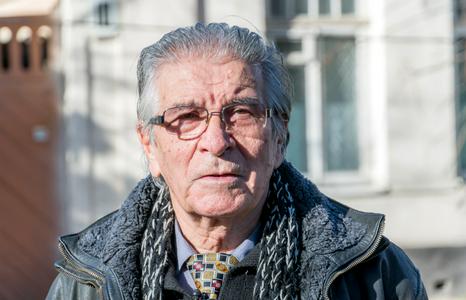 05 February05.02The “Guardian” of Old Tashkent Has Passed AwayRenowned local historian and popularizer of Uzbekistan’s history Boris Anatolyevich Golender dies
05 February05.02The “Guardian” of Old Tashkent Has Passed AwayRenowned local historian and popularizer of Uzbekistan’s history Boris Anatolyevich Golender dies -
 24 December24.12To Clean Up and to ZIYAWhat China Can Offer Central Asia in the “Green” Economy
24 December24.12To Clean Up and to ZIYAWhat China Can Offer Central Asia in the “Green” Economy -
 23 December23.12PhotoTokyo DriveJapan to invest about $20 billion in projects across Central Asia over five years
23 December23.12PhotoTokyo DriveJapan to invest about $20 billion in projects across Central Asia over five years -
 17 December17.12Sake for SixCentral Asia’s Rapprochement with Japan Comes with Hidden Pitfalls
17 December17.12Sake for SixCentral Asia’s Rapprochement with Japan Comes with Hidden Pitfalls -
 17 December17.12Gulshan Is the BestYoung Uzbek Karateka Becomes World Champion
17 December17.12Gulshan Is the BestYoung Uzbek Karateka Becomes World Champion
